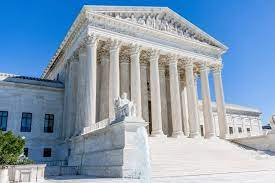
A group of vaping businesses and trade organizations have filed an amicus curiae brief with the U.S. Supreme Court, urging the justices in a non-vaping related case to overturn or limit so-called Chevron deference. The court’s decision will affect how judges in lower courts rule on future disputes over administrative agency actions—including FDA actions on vaping product regulation.
Chevron deference (also called the Chevron Doctrine) is the legal doctrine, established in the 1984 Supreme Court decision Chevron U.S.A., Inc. v. Natural Resources Defense Council, Inc., that requires courts to defer to an administrative agency’s interpretation of ambiguous statutes as long as the agency’s interpretation is not unreasonable and Congress (in writing the law) did not directly address the issue in question.
The case before the Supreme Court is Loper Bright Enterprises v. Raimondo, in which a family-owned herring fishing company challenged a federal agency mandate that forced the fishing industry to pay the costs of federal monitoring of New England fisheries. The court has agreed to hear the case in its next session, meaning a decision will come next year. Many observers think the court’s conservative majority is ready to end Chevron deference.

Arguments over Chevron deference fall generally along liberal and conservative theories of government. Liberals want regulatory issues decided by agencies applying neutral expertise, and conservatives oppose granting unchecked power to unelected bureaucrats. The Supreme Court decision, if it limits or eliminates Chevron deference, will affect how laws are written by Congress, carried out by federal agencies, and interpreted by the courts.
Chevron deference has limited courts ruling on vaping-related federal lawsuits from questioning the FDA’s interpretation of its authority as laid out in the 2009 Family Smoking Prevention and Tobacco Control Act. Following the agency’s 2016 Deeming Rule—in which the FDA granted itself authority to regulate e-cigarettes as tobacco products—most courts have agreed that the agency’s actions were “reasonable,” and therefore not challengeable under Chevron deference.
Attorneys Azim Chowdhury and Eric Gotting of Washington, D.C. law firm Keller and Heckman—two of the amicus brief’s co-authors—write in a blog explaining the brief that, in the years since the Deeming Rule, “the vast majority of courts reviewing ENDS industry challenges to premarket application denials, as well as FDA rulemakings and guidance documents, have simply rubber-stamped the agency’s interpretation of the Family Smoking Prevention and Tobacco Control Act (TCA) and the ‘appropriate for the protection of the public health’ (APPH) standard.”

The amicus brief explains how Chevron deference has affected vaping businesses subject to FDA regulation and enforcement—especially the agency’s execution of the premarket tobacco application (PMTA) review process, which according to the Tobacco Control Act requires the FDA to review each application individually.
“But in a Chevron world,” write Chowdhury and Gotting, “FDA has ventured far beyond the statute’s plain language and goals, and instead issued cookie-cutter marketing denial orders (MDOs) for well over a million non-tobacco flavored products based on only a cursory review of those applications.”
Many of the companies denied marketing authorization by the FDA have taken the agency to court, challenging its authority to issue those “cookie-cutter MDOs.” But most of them have encountered judges unwilling to reverse the agency, often due to Chevron. The result: not a single non-tobacco-flavored vaping product has been authorized, even though the FDA has never created a rule prohibiting non-tobacco flavors.
The third co-author of the amicus brief, along with Chowdhury and Gotting, is J. Gregory Troutman of the Troutman Law Office in Louisville, Kentucky. The 25 signatories to the brief include e-liquid and device manufacturers, flavoring companies, vape retailers, and state trade associations:
·American Vape Company, LLC
·American Vaping Manufacturers Association
·American Vapor Group (Red Star Vapor)
·Bidi Vapor, LLC
·Ecig Charleston LLC
·Flavour Art North America
·Florida Smoke Free Association, Inc.
·FLV USA (Flavorah)
·Indiana Smoke Free Alliance, Inc.
·Kentucky Vaping Retailers Association, Inc.(Kentucky Smoke Free Association)
·Matrix Minds, LLC
·Michigan Vape Shop Owners, Inc.
·Montana Smoke Free Association, Inc.
·NicQuid, LLC
·Ohio Vapor Trade Association Inc.
·Pastel Cartel, LLC
·South Carolina Vapor Associations
·SS Vape Brands
·Streamline Group/MH Global
·SV3, LLC
·Tennessee Smoke Free Association, Inc.
·Vape Element LLC (BLVK E-Liquid)
·Wages and White Lion Investments, LLC (Triton Distribution)
·White Horse Vapor
·YLSN Distribution LLC (Happy Distro)
